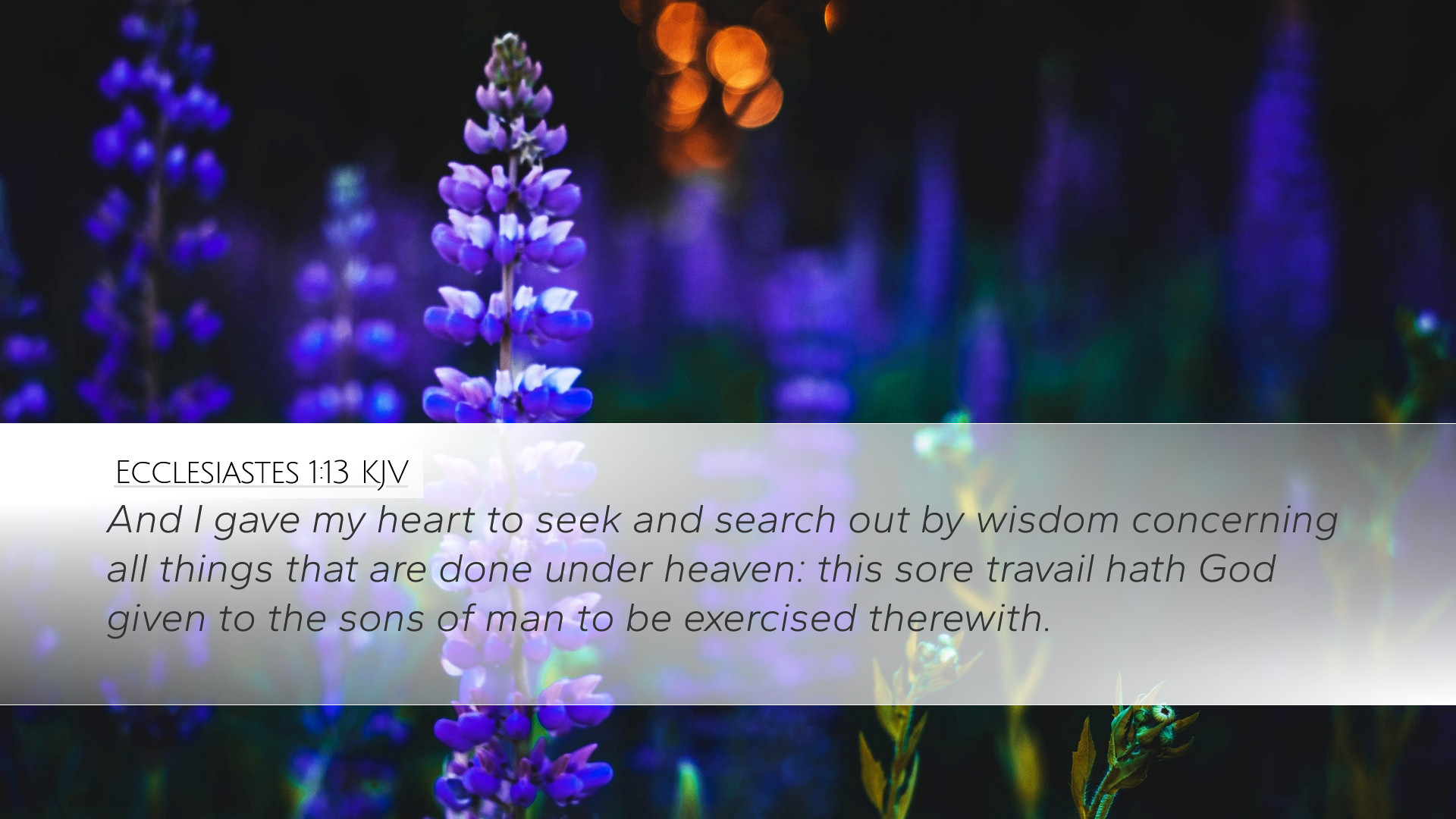Ecclesiastes 1:13 - Commentary Summary
Ecclesiastes 1:13: “And I gave my heart to seek and search out by wisdom concerning all things that are done under heaven: this sore travail hath God given to the sons of man to be exercised therewith.”
Introduction
The verse under examination is a profound statement on the nature of human life and the quest for understanding. In this wise reflection, the Preacher, traditionally understood to be Solomon, embarks on a journey to grasp the complexities and burdens of existence. The insights drawn from various public domain commentaries offer a robust explication of this verse, shedding light on its theological, philosophical, and practical implications.
Overview and Analysis
Ecclesiastes 1:13 serves as a crucial starting point in the Wisdom Literature of the Old Testament, encapsulating themes of wisdom, toil, and the divine ordinance of human endeavor. Let's explore the insights from notable commentators:
1. Matthew Henry's Commentary
Henry emphasizes the deliberate choice to search for wisdom as an unavoidable part of human existence. He notes that:
- This quest for wisdom—the pursuit of understanding and knowledge—is intrinsic to mankind.
- It reflects God’s design, presenting life as a “sore travail,” yet a necessary aspect of human experience, prompting individuals towards action and contemplation.
- The verse encapsulates human limitations and divine sovereignty, indicating that God has ordained the struggles and labor of mankind.
Through Henry’s lens, the Preacher’s declaration calls for an acknowledgment of the burdens of life while simultaneously advocating for the pursuit of understanding through wisdom.
2. Albert Barnes' Notes on the Bible
Barnes highlights the contrast inherent in the pursuit of wisdom. He remarks:
- The “sore travail” denotes the hardships and frustrations that accompany wisdom seeking; it is not simply an intellectual endeavor but a laborious process filled with trials.
- Barnes elaborates on the term “God given,” underscoring that the struggles are divinely appointed, suggesting that this very travail serves a purpose in refining human character and faith.
- This pursuit is portrayed as both a blessing and a burden, rooted in the recognition that while knowledge can enlighten, it also exposes the futility of many human endeavors in the face of eternity.
Barnes encourages readers to find meaning within the struggles, viewing them as opportunities for spiritual and moral growth.
3. Adam Clarke's Commentary
Clarke delves into the philosophical implications of this quest for knowledge. His observations include:
- He notes that the effort to seek knowledge and wisdom can lead to both enlightenment and despair, as one might discover the limits of human understanding.
- Clarke attributes this pursuit to the inherent curiosity embedded in human nature, suggesting that it reflects a divine longing within man to connect with the Creator and comprehend His creation.
- He stresses that this travail leads to deeper existential questions, prompting humanity to grapple with the purpose of life and the essence of wisdom.
Clarke’s perspective emphasizes that seeking wisdom is a journey filled with both blessings and burdens, thus inviting readers to persevere in their quest despite the challenges.
Theological Implications
From the amalgamation of these commentaries, several theological themes can be discerned:
- Human Limitation and Divine Sovereignty: The verse speaks to the inherent limitations of human wisdom contrasted with God’s ultimate authority over life’s course.
- Suffering and Purpose: The toil involved in seeking wisdom is not meaningless; it is divinely ordained to lead humanity towards growth and understanding.
- Exploration of Meaning: The continuous search for knowledge reflects a deeper spiritual longing and the human drive to understand both existence and Creator.
Practical Applications
For pastors, scholars, and students, Ecclesiastes 1:13 serves as a foundational text inviting reflection and action. Consider the following applications:
- Encouragement for the Journey: Encourage congregations to embrace the pursuit of wisdom in their spiritual and daily lives, recognizing that struggles can refine character.
- Facilitating Understanding: Teach the importance of seeking knowledge both biblically and academically, promoting a holistic understanding of wisdom.
- Recognizing Divine Purpose: Emphasize that every challenge faced in the pursuit of wisdom can be viewed as a tool for spiritual growth and understanding of God’s will.
Conclusion
In summary, Ecclesiastes 1:13 presents profound truths about the quest for wisdom. The insights from Matthew Henry, Albert Barnes, and Adam Clarke provide valuable perspectives tailored for those engaged in theological study and ministry. As we navigate the complexities of life imbued with toil, we are reminded of the dual nature of our pursuit—one that is both a burden and a vehicle for deeper understanding of God and our place in His creation. This verse challenges us to see our struggles not as mere frustrations but as a designed part of the human experience, propelling us toward divine wisdom.


